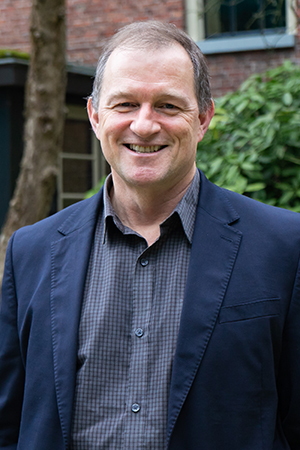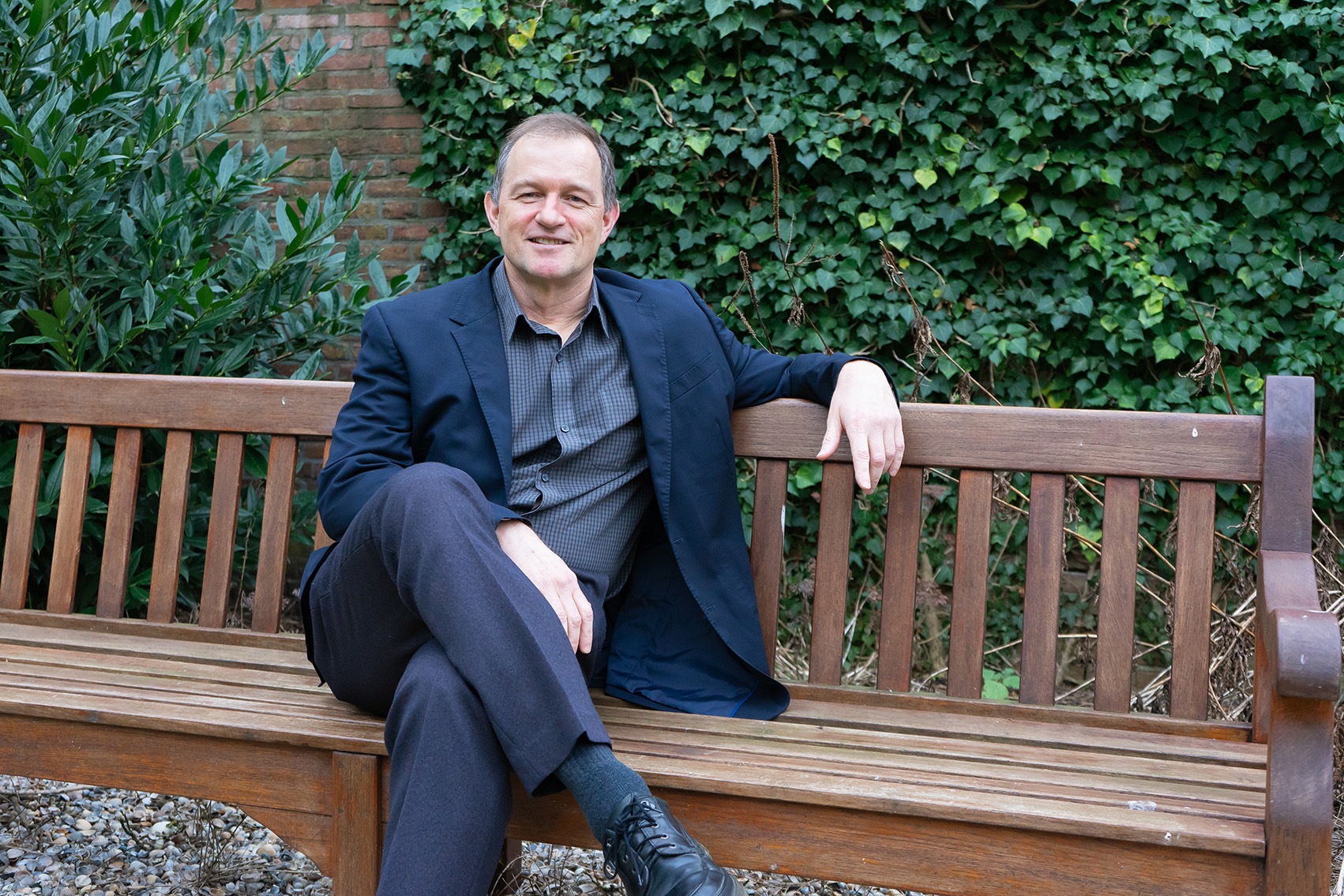Geschiedenis, menselijk kunnen - en cocaïne
Hij is een gerespecteerd onderzoeker, geëerd met een driedaagse internationale conferentie rond zijn nieuwste boek en deskundige in een Discovery-documentaire. Maar Steve Mason is allesbehalve zelfgenoegzaam. Integendeel, deze professor Oude Mediterrane Religies en Culturen zegt dat hij nergens trots op is. 'De helft van de tijd voel ik me een bedrieger omdat ik niets weet, tenminste niet iets tastbaars.'
Tekst: Annemieke van der Kolk, Communicatie RUG / Foto's: Daniel Houben

Waarom ouwe meuk bestuderen?
Steve Mason, kort bruin haar, kalme en vriendelijke uitstraling, vraagt liever aandacht voor zijn vakgebied dan voor zichzelf. De geluiden van het café - Mason heeft geen eigen kantoor - overstemmen bijna zijn kalme en zachte stem. Maar bij de vraag of de mensheid van de geschiedenis kan leren, veert hij op: 'De studie van geschiedenis moet je altijd rechtvaardigen. Want waarom zou je in vredesnaam ouwe meuk bestuderen? We willen graag zeggen dat we van geschiedenis kunnen leren, maar ik geloof dat hoe beter we het verleden kennen, hoe meer we beseffen dat diezelfde situaties nooit meer zullen voorkomen.' Niets leren we van de geschiedenis, daarvan is Mason overtuigd. 'In plaats daarvan stelt het bestuderen van geschiedenis ons in staat de mogelijkheden van het menselijk bestaan te begrijpen, en om los te komen van onze eigen beperkte visies.'
Ontsnappen aan het keurslijf
Net terug uit Rome neemt Mason de Romeinse overblijfselen uit de eerste eeuw als voorbeeld. 'Het is geweldig de bouwmethoden van de Romeinen te zien en de manier waarop ze hun politieke leven structureerden. Niet dat we dat moeten reproduceren, het is immers een totaal andere wereld. Maar het inspireert wel en het staat in enorm contrast met ons huidige technocratische keurslijf, beheerst door sociaal-economische en politieke ontwikkelingen. Het is verrijkend om andere mogelijkheden te kunnen overwegen, om te weten dat we in staat zijn nieuwe leefstijlen te ontwikkelen voor onze huidige omstandigheden.’
Oude teksten in de sportschool
Moeiteloos verbindt Mason zijn vakgebied met de moderne tijd. Zelfs in de sportschool, als hij aan het trainen is, heeft hij oude teksten op zijn koptelefoon. 'Gisteren luisterde ik naar De Staat van Plato. Daarin staat een passage over rechtvaardigheid, over hoe iemand kan veinzen rechtvaardig te zijn als hij maar genoeg spindoctors heeft om zijn imago te bewerken. Dat zou zo een citaat kunnen zijn uit recent opiniestuk over, laten we zeggen, de Amerikaanse politiek. Geschiedenis zet ons aan het denken en activeert ons als weldenkende deelnemers aan deze samenleving. We leren niets van geschiedenis, maar het is wel verdomd interessant.'
Geschiedenis is als cocaïne
Mason verheft zijn stem niet en maakt weinig gebaren of grappen. Zijn verhaal spreekt voor zich. 'Wij denken soms dat onze problemen uniek zijn of dat de wereld naar de verdoemenis gaat. Maar de mensheid heeft eerder enorme problemen overwonnen. Dat te weten functioneert als een ijkpunt voor ons. En dat hebben we nodig.’ Het is even stil en dan grinnikt Mason: ‘Dit is waarom mijn werk zo leuk is. Het is net cocaïne, maar dan legaal. Maar zet er alsjeblieft bij dat ik nooit echt cocaïne heb gebruikt en dat ik het dus eigenlijk niet weet.’
Verscheurd tussen geloof en wetenschap
Opgegroeid als een conservatieve christen in Canada, raakte Mason er snel van overtuigd dat religie het belangrijkste is in deze wereld, aanzienlijk belangrijker dan een baan of veel geld. Zijn brandende vragen over de oorsprong van het jodendom en het christendom leidden hem naar de universiteit, waar hij religies vanuit historisch oogpunt bestudeerde. 'Dat was fantastisch, maar het veranderde mijn zienswijze ook volledig. Ik kon niet langer mijn visie handhaven van een goddelijke waarheid die uit de hemel kwam vallen.’ In zijn recente boek A History of the Jewish-Roman War, AD 66-74, paste Mason historische onderzoeksmethoden toe op de grote opstand tegen de Romeinen die 2000 jaar geleden plaatsvond. ‘Je trekt dan noodzakelijkerwijs veel van de overgeleverde tradities in twijfel en sommige blijken volledig ongegrond te zijn. Daarom heb ik rond mijn twintigste mijn geloof opgegeven. Ik kon historisch onderzoek niet combineren met mijn religieuze overtuiging. Vanuit je geloof weten dat een Bijbelse gebeurtenis feitelijk heeft plaatsgevonden en het tegelijkertijd aan historisch onderzoek onderwerpen, verscheurt je.’
Bescheiden type
Mason verliet de kerk, maar bloeide op als academicus. Zijn werkterrein beperkt zich niet tot de academische wereld. Vaak wordt hij gevraagd deel te nemen aan televisiepanels en documentaires. De Discovery-documentaire The Fatal Conflict - Judea and Rome met daarin Mason als deskundige, is binnenkort te zien in Europa. Opnieuw blijkt Mason een bescheiden man: 'Natuurlijk is zoiets spannend en vleiend, maar ze interviewen je urenlang en zenden vervolgens slechts 30 of 60 seconden uit op een manier die je niet had bedoeld.' Voor deze specifieke documentaire beloofden de makers oprecht Masons woorden in de juiste context weer te geven. Hij heeft hem nog niet gezien, zelfs de trailer niet: 'Ik kan het niet verdragen naar mijzelf te kijken.'
Wereldregering
Voor zijn boek over de Joodse oorlog onderzocht Mason hoe mensen reageerden op het feit dat het politieke systeem hen niet kon beschermen. 'Dit is vandaag de dag erg relevant. We hebben geprobeerd mondiale instellingen op te tuigen om de vrede te handhaven, maar ze zijn niet heel effectief, kijk maar naar de Verenigde Naties. Landen zoals de V.S., China of Rusland willen niet van anderen horen wat goed voor ze is. Dat zit diepgeworteld: ik heb ongelooflijk scherpe citaten gelezen in Plato's Staat en de Politika van Aritoteles over de relatie tussen macht en rechtvaardigheid. Hun vragen over de mogelijkheid van een wereldregering zijn nog steeds relevant.’ Mason herhaalt nog eens waar hij rotsvast van overtuigd is: 'Oude teksten leren ons geen lessen. Ze bieden ons geen oplossingen maar helpen ons na te denken over de mogelijkheden en beperkingen van het menselijk bestaan.'
Hoop voor de mensheid?
Kan de mensheid een hoger niveau bereiken? 'Ik pretendeer niet het antwoord te weten, ik ben maar een historicus', lacht Mason. 'Het is nog niet bewezen, maar ik zeg niet dat het onmogelijk is. De vraag is: wat kun jij doen om daaraan bij te dragen?'

Meer nieuws
-
06 januari 2026
Geschiedenis dichterbij brengen
-
10 juni 2025
RUG en Rijksmuseum tekenen samenwerkingsovereenkomst
